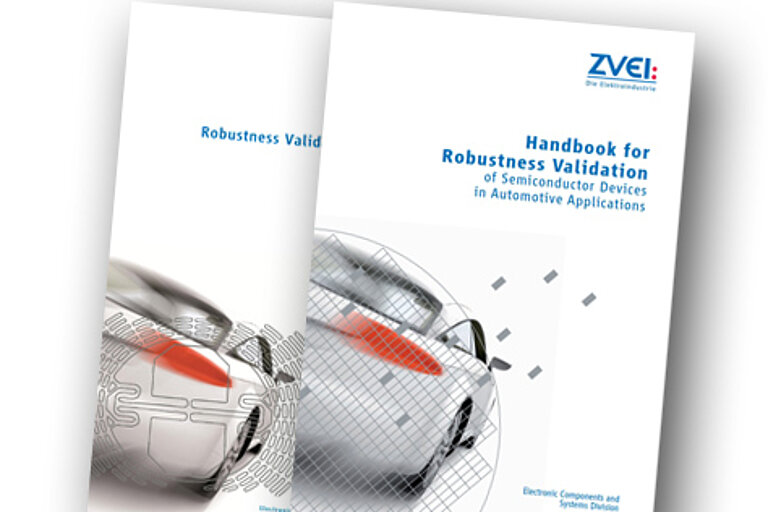Robustness Validation - Device Level
For the ZVEI, electric vehicles are a key to the climate- and environmentally-compatible mobility of the future. Reliable and constant general conditions in particular are essential to make Germany the lead supplier in this field.

"Qualification tests of prototypes must ensure that quality and reliability targets have been reached"!? This approach is no longer sufficient to guarantee robust electronic products for a failure free life of complex applications as cars or others.
The emphasis has now shifted from merely detecting failures to preventing them, as it is the intention of a Zero-Defect-Approach. Robustness Validation (RV) is a valuable failure-mechanism-driven approach to product reliability and qualification, which relates real application conditions to test conditions.
Handbook for Robustness Validation of Semiconductor Devices in Automotive Applications (3rd edition)
As semiconductors are most complex and test needing devices, the new test approach is described exemplarily for those, which could also be transferred to all other components. Many companies, semiconductor manufacturers, component manufacturers (Tier1) and car manufacturers (OEMs) brought together the knowledge of the complete supply chain in this basic handbook. It gives guidance to engineers how to apply robustness validation during development and qualification of semiconductor (electronic) components.
This 3rd Edition takes respect to and explains the Robustness Validation Flow Charts shown in the current AEC Q100/Q101.
Knowledge Matrix Semiconductor
The Knowledge Matrix contents a table of different failure mechanisms in respect to the stage where they occur and the related stress method, acceleration model and references to existing test methods / standards.
Template for a standardized reporting process
As an Annex to the Robustness Validation Handbook this Word Document can be used for a standardized reporting process. Depending on the customer request, three different levels of reporting could be generated.
Appendix: Robustness Validation for MEMS
MEMS sensors build up a special category of devices that need specific considerations. By their very nature, MEMS sensors are often exposed to harsh environmental conditions that are in an obvious way not covered by standard stress test conditions used in product qualifications. Robustness Validation, in respect to special sensor needs, had been described in detail on over 30 pages by ZVEI sensor manufacturers.
